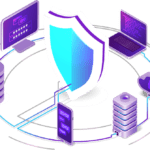Securing organizational data has become paramount in an era where the digital sphere is not only a business tool but a critical part of everyday operations. Navigating through the maze of cybersecurity compliance is daunting, considering the ever-evolving regulatory requirements and cyber security regulations. Hence, an understanding of cybersecurity compliance program essentials is crucial.
The EU’s General Data Protection Regulation (GDPR) is the most recent example of how the compliance landscape can change overnight. With the GDPR now in effect, companies must ensure they comply with the regulation or face stiff penalties.
Small to medium-sized organizations often struggle to implement effective security controls and maintain a robust information security management system. The stakes are high; non-compliance exposes businesses to cyber-attacks and can lead to substantial penalties under stringent data protection laws.
To mitigate these risks, adopting a systematic risk governance approach that involves regular risk assessments and continuously updated security practices is imperative. Achieving compliance doesn’t end with adhering to international standards or local regulations. It’s an ongoing process requiring a proactive approach to detecting potential data breaches and responding promptly.
This guide demystifies the complex web of cybersecurity compliance. From an introduction to its critical importance to its role in your specific sector, and finally, how to measure cyber maturity, this guide offers a comprehensive overview to help you establish and maintain an information security program that aligns with regulatory compliance requirements.
But, beyond this guide, achieving cybersecurity compliance might demand expert help. This is where Oppos Cybersecurity comes in. Our compliance team are well-equipped to navigate through the intricate cybersecurity framework, offering valuable advice and executing systematic risk assessments. Our commitment? To keep your organization secure, compliant, and prepared for an ever-evolving digital landscape.
Contact us today to further explore how Oppos Cybersecurity can support your cybersecurity compliance journey. Let’s take that vital step towards a safer digital future for your organization.

Why Is Compliance Important in Cybersecurity?
So why is compliance important in cybersecurity? Firstly, compliance standards help to ensure that organizations have the necessary controls in place to protect their data. Compliance serves as a minimum standard that the organization must meet within a certain industry or geographical area. Some common examples of this will be access controls, network monitoring, mandatory penetration testing and mandatory encryption.
Secondly, compliance makes sure that customers have their data rights upheld by requiring that companies have the proper controls in place and the proper procedures in place to uphold data privacy rights. For example within the GDPR compliance regulation companies are required to respond to customer data privacy requests in a certain time frame, they must delete data upon request, they must tell customers what data they have collected on them and more.
What is Cybersecurity Compliance in your Sector?
Cybersecurity compliance varies depending on the sector your business operates in. Each industry faces unique cybersecurity risks and has specific regulations and standards to adhere to. Compliance is not optional but essential to mitigate cybersecurity threats, protect sensitive data, and maintain industry regulations. Whether you’re in retail, law, insurance, manufacturing, healthcare, financial services, government, the energy sector, or consumer businesses, a robust cybersecurity compliance program is needed. Understanding the specific requirements for your sector, from PCI DSS in retail to HIPAA in healthcare, is vital to ensure continuous monitoring, risk prevention, and threat prevention and avoid data breaches.Retail
PCI DSS Compliance
The PCI DSS (Payment Card Industry Data Security Standard) is a set of security standards that businesses must adhere to in order to accept credit and debit card payments. PCI compliance is required for any business that processes, transmits or stores credit card information.
There are 12 requirements for PCI compliance, which are organized into six categories:
- Build and Maintain a Secure Network
- Protect Cardholder Data
- Maintain a Vulnerability Management Program
- Implement Strong Access Control Measures
- Regularly Monitor and Test Networks
- Maintain an Information Security Policy
These requirements cover areas such as data security, firewalls, password management and more. PCI compliance is an important part of keeping your customers’ credit card information safe, and it is something that all businesses that accept credit card payments should take seriously.
International
GDPR Compliance
The GDPR is a set of regulations that member states of the European Union implemented in order to protect the privacy of digital data. The regulation is also known as the EU Data Protection Regulation, Reg. No. 765/2016.
The regulation requires businesses to take steps to protect the personal data of EU citizens from being collected, used, or disclosed without the individual’s consent. Businesses that violate the GDPR can be fined up to 4% of their annual global revenue or €20 million (whichever is greater), whichever is greater.
As of May 25, 2018, all businesses that process the personal data of EU citizens must be in compliance with the GDPR. If you are not in compliance, you may be subject to the aforementioned fines.
State-Specific Compliance
CCPA Compliance
The California Consumer Privacy Act (CCPA) is a new law that went into effect on January 1, 2020. CCPA affects all businesses that operate in California or collect data on California residents. The CCPA gives consumers several rights including the right to know what personal information is being collected about them, the right to refuse the sale of their personal information, and the right to have their personal information deleted.
SOX Compliance
The Sarbanes-Oxley Act (SOX) was passed in 2002 in response to the Enron scandal. The act includes a number of provisions to protect investors from fraud and deception. One of the key provisions of SOX is the requirement for publicly traded companies to maintain accurate financial records.
SOX compliance is a complex and ever-changing process, but there are a few key things that all companies need to do in order to comply with the law. First, all companies must have an internal control system in place to ensure the accuracy of their financial records. Second, companies must disclose any material changes to their internal control systems. Finally, companies must have an independent auditing firm review their financial statements and attest to their compliance with SOX.
Healthcare
HIPAA Compliance
The Health Insurance Portability and Accountability Act (HIPAA) is a federal law that protects the privacy of patient health information. HIPAA compliance is required for all healthcare providers and organizations that deal with protected health information (PHI).
HIPAA compliance involves making sure that all PHI is kept secure and confidential. This includes ensuring that only authorized individuals have access to PHI, and that PHI is only used for authorized purposes. HIPAA also requires that healthcare providers and organizations take steps to protect PHI from being lost or stolen.
Financial services
The Gramm-Leach-Bliley Act (GLBA)
The Gramm-Leach-Bliley Act (GLBA) is a U.S. federal law that requires financial institutions to protect the confidentiality and security of customer information. The law was enacted in 1999 in response to the collapse of several large banks that had taken on too much risk.
The GLBA requires financial institutions to develop and implement policies and procedures to protect customer information from unauthorized access or disclosure. Financial institutions must also provide customers with a notice of their privacy rights and choices.
The GLBA applies to all financial institutions that do business in the United States, including banks, credit unions, securities firms, and insurance companies.
The GLBA has three main provisions:
- Financial institutions must disclose their information-sharing practices to their customers.
- Financial institutions must take steps to protect the confidentiality of customer information.
- Financial institutions must provide customers with access to their own information.
Government
CMMC Compliance
The Cybersecurity Maturity Model Certification (CMMC) is a compliance framework that is required for all companies that work with the Department of Defense (DoD) supply chain including contractors and subcontractors. The purpose of CMMC is to ensure that all companies that handle DoD data are taking proper steps to protect that data from cyber threats. The CMMC Model is a tiered system, with Level 1 being the basic cybersecurity hygiene and Level 5 being the highest level of cybersecurity maturity. The CMMC Model consists of 17 domains:
Access Control, Awareness and Training, Audit and Accountability, Configuration Management, Identification and Authentication, Incident Response, Maintenance, Media Protection, Physical Protection, Recovery, Risk Management, Security Assessment, Situational Awareness, System and Communications Protection, and System and Information Integrity.
What's your cybersecurity grade?
How to Know When you’ve Achieved Cyber Maturity
To understand when an organization has achieved cyber maturity, it’s important first to understand what it is. Cyber maturity is typically a measurement of how well-organized and efficient an organization’s cybersecurity programs are. An immature organization tends to have informal processes, missing controls, and an ineffective cybersecurity program. A mature organization is constantly working to identify and mitigate vulnerabilities and to better understand and respond to the cyber threats they face. There is no one-size-fits-all approach to achieving maturity, as each organization has different needs and priorities. However, one of the best approaches to achieving it is to use well-established frameworks. One popular framework for measuring your organization’s current cybersecurity maturity is the cybersecurity capability maturity model (C2M2). This is a free tool that you can use to evaluate your current cybersecurity capabilities and optimize your future security investments. Using tools like this, you can get a good idea of where your organization ranks and what improvements need to be made going forward.Conclusion
In conclusion, it is essential for businesses to be aware of and compliant with various cybersecurity regulations. Different industries have their own unique requirements, but there are some general best practices that all businesses should follow. Our Oppos consultants have over 10+ years of experience helping organizations of all sizes to meet cybersecurity compliance standards.
Our risk analysis process is comprehensive, identifying potential cybersecurity risks and implementing proactive security measures. Continuous monitoring and threat prevention are at the heart of our services, allowing us to respond to any potential data breach promptly.
Reach out to us via our contact page to speak with one of our consultants for free and to learn more about how to keep your business compliant. We will help you create a cybersecurity compliance plan and implement security methods to protect sensitive information.
Don't wait – secure your data with Oppos' Cybersecurity Compliance
Cybersecurity Compliance FAQs
Governance, risk, and compliance (GRC) is a term used to describe the totality of an organization’s efforts to manage its risks, meet its compliance obligations, and deliver on its governance objectives. Cyber security is a subset of GRC that deals specifically with risks related to technology and information security.
Some of the key challenges include constantly changing regulations, implementing the required changes to the environment, internal resistance from employees and maintaining compliance over time.
You should assess your cybersecurity compliance at least annually, preferably semi-annually.
The best way to ensure cyber security compliance is through working with specialized firms that have a good track record of helping companies achieve compliance in the regulations that you are interested in. For example, you can find a list of the compliance regulations that oppos specializes in on the service page.
Yes. Depending on the regulation, penalties for non-compliance can range from relatively minor (e.g., a warning letter) to very serious (e.g., imprisonment or heavy fines).






